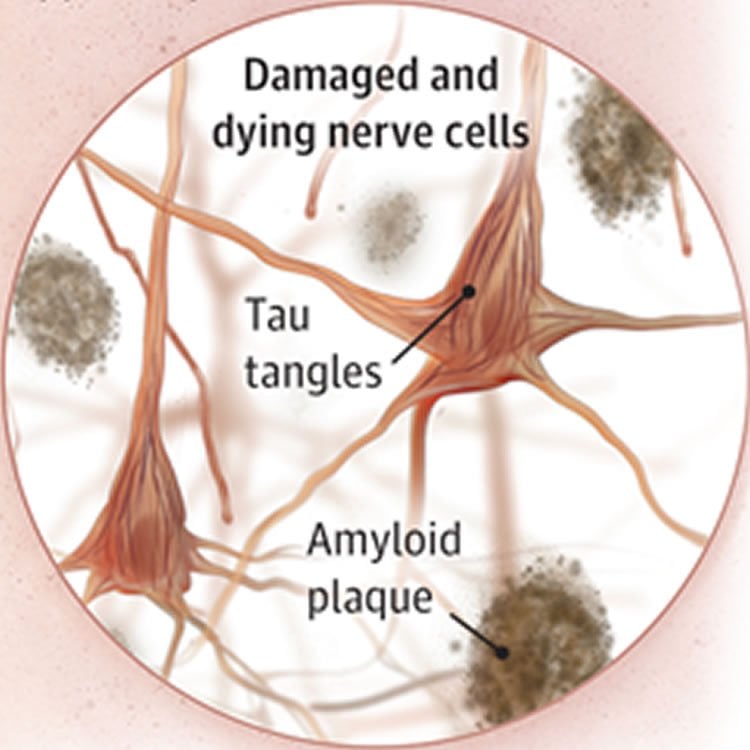Study also finds higher levels of mercury in brain is not linked to an increased risk for Alzheimer’s.
In a study of deceased individuals, moderate seafood consumption was correlated with lesser Alzheimer disease neuropathology. Although seafood consumption was associated with higher brain levels of mercury, the higher mercury levels were not correlated with more Alzheimer disease neuropathology. The study appears in the February 2 issue of JAMA.
Numerous studies have found protective associations between seafood consumption and dementia. Little is known about the relationship between seafood consumption and brain neuropathology. Seafood is a source of mercury, a neurotoxin that impairs neurocognitive development. Mercury toxicity is reduced by selenium, an essential nutrient present in seafood.

Martha Clare Morris, Sc.D., of Rush University Medical Center, Chicago, and colleagues examined whether seafood consumption is correlated with increased brain mercury levels and also whether seafood consumption or brain mercury levels are correlated with brain neuropathologies. The study included analyses of deceased participants in the Memory and Aging Project clinical neuropathological cohort study, 2004-2013. The average age at death was 90 years and 67 percent were women. Seafood intake was first measured by a food frequency questionnaire at an average of 4.5 years before death.
Among the 286 autopsied brains of 544 participants, brain mercury levels were positively correlated with the number of seafood meals consumed per week. In models adjusted for age, sex, education, and total energy intake, seafood consumption (one or more meal[s]/week) was significantly correlated with less Alzheimer disease pathology, including lower density of neuritic plaques, less severe and widespread neurofibrillary tangles and lower neuropathologically defined Alzheimer disease, but only among apolipoprotein E (APOE ε4) carriers, a gene variant associated with an increased risk of developing Alzheimer disease.
Fish oil supplementation had no statistically significant correlation with any neuropathologic marker. Although seafood consumption was correlated with higher brain levels of mercury, the higher mercury levels were not significantly correlated with increased levels of brain neuropathology.
The authors note that the findings were from a very old, largely non-Hispanic white cohort and may not be generalizable to younger adults or other racial or ethnic groups.
“To our knowledge, this is the first study to report on the relationship between brain concentrations of mercury and brain neuropathology or diet. The finding of no deleterious correlations of mercury on the brain is supported by a number of case-control studies that found no difference between Alzheimer disease patients and controls in mercury concentrations in the brain, serum, or whole blood.”
“Patients and their families may be hopeful that interventions such as seafood consumption may help reduce clinical manifestations of Alzheimer disease or dementia, and the report by Morris et al provides reassurance that seafood contamination with mercury is not related to increased brain pathology,” write Edeltraut Kroger, Ph.D., and Robert Laforce Jr., M.D., Ph.D., of Universite Laval, Quebec City, Quebec, Canada, in an accompanying editorial.
“Eating fatty fish may continue to be considered potentially beneficial against cognitive decline in at least a proportion of older adults, a strategy that now generally should not be affected by concerns about mercury contamination in fish. Such a simple strategy is encouraging in the light of the lack of evidence on protection against many neurodegenerative diseases such as Alzheimer disease and Parkinson disease, another cause of dementia.”
Study conducted in association with NIH/National Institute of Environmental Health Sciences.
Fudning: The study was funded by NIH/National Institute of Environmental Health Sciences, NIH/National Institute on Aging. Grants: R01AG031553, R21ES021290, R01AG017917.
Source: Nancy Di Fiore – JAMA Network
Image Credit: The image is credited to JAMA
Original Research: Full open access research for “Association of seafood consumption, brain mercury level and APOE-ε4 status with brain neuropathology in older adults” by Morris MC, Brockman J, Schneider JA, Wang Y, Bennett DA, Tangney CC, and van de Rest O. in JAMA. Published online February 2 2016 doi:10.1001/jama.2015.19451
Abstract
Association of seafood consumption, brain mercury level and APOE-ε4 status with brain neuropathology in older adults
Importance Seafood consumption is promoted for its many health benefits even though its contamination by mercury, a known neurotoxin, is a growing concern.
Objective To determine whether seafood consumption is correlated with increased brain mercury levels and also whether seafood consumption or brain mercury levels are correlated with brain neuropathologies.
Design, Setting, and Participants Cross-sectional analyses of deceased participants in the Memory and Aging Project clinical neuropathological cohort study, 2004-2013. Participants resided in Chicago retirement communities and subsidized housing. The study included 286 autopsied brains of 554 deceased participants (51.6%). The mean (SD) age at death was 89.9 (6.1) years, 67% (193) were women, and the mean (SD) educational attainment was 14.6 (2.7) years.
Exposures Seafood intake was first measured by a food frequency questionnaire at a mean of 4.5 years before death.
Main Outcomes and Measures Dementia-related pathologies assessed were Alzheimer disease, Lewy bodies, and the number of macroinfarcts and microinfarcts. Dietary consumption of seafood and n-3 fatty acids was annually assessed by a food frequency questionnaire in the years before death. Tissue concentrations of mercury and selenium were measured using instrumental neutron activation analyses.
Results Among the 286 autopsied brains of 544 participants, brain mercury levels were positively correlated with the number of seafood meals consumed per week (ρ = 0.16; P = .02). In models adjusted for age, sex, education, and total energy intake, seafood consumption (≥ 1 meal[s]/week) was significantly correlated with less Alzheimer disease pathology including lower density of neuritic plaques (β = −0.69 score units [95% CI, −1.34 to −0.04]), less severe and widespread neurofibrillary tangles (β = −0.77 score units [95% CI, −1.52 to −0.02]), and lower neuropathologically defined Alzheimer disease (β = −0.53 score units [95% CI, −0.96 to −0.10]) but only among apolipoprotein E (APOE ε4) carriers. Higher intake levels of α-linolenic acid (18:3 n-3) were correlated with lower odds of cerebral macroinfarctions (odds ratio for tertiles 3 vs 1, 0.51 [95% CI, 0.27 to 0.94]). Fish oil supplementation had no statistically significant correlation with any neuropathologic marker. Higher brain concentrations of mercury were not significantly correlated with increased levels of brain neuropathology.
Conclusions and Relevance In cross-sectional analyses, moderate seafood consumption was correlated with lesser Alzheimer disease neuropathology. Although seafood consumption was also correlated with higher brain levels of mercury, these levels were not correlated with brain neuropathology.
“Association of seafood consumption, brain mercury level and APOE-ε4 status with brain neuropathology in older adults” by Morris MC, Brockman J, Schneider JA, Wang Y, Bennett DA, Tangney CC, and van de Rest O. in JAMA. Published online February 2 2016 doi:10.1001/jama.2015.19451






